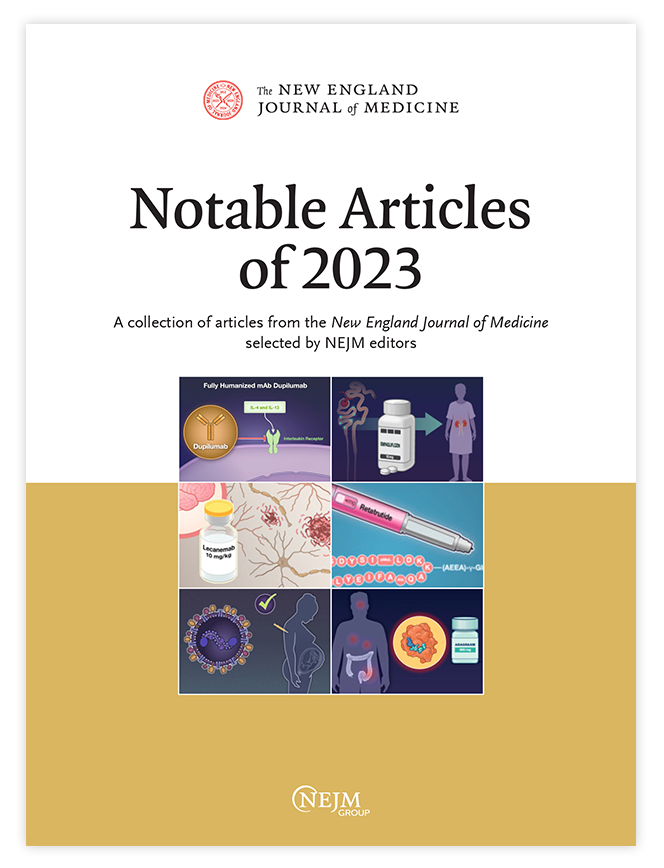Low-Dose Aspirin for PI3K-Altered Localized Colorectal Cancer.
IF 78.5
1区 医学
Q1 MEDICINE, GENERAL & INTERNAL
引用次数: 0
Abstract
BACKGROUND Aspirin reduces the incidence of colorectal adenoma and colorectal cancer among high-risk persons. Observational studies suggest that aspirin may also improve disease-free survival after diagnosis, particularly among patients with tumors harboring somatic PIK3CA mutations. However, data from randomized trials are lacking. METHODS We conducted a double-blind, randomized, placebo-controlled trial involving patients with stage I, II, or III rectal cancer or stage II or III colon cancer with somatic alterations in PI3K pathway genes. The patients were assigned in a 1:1 ratio to receive 160 mg of aspirin or matched placebo once daily for 3 years. Patients with prespecified PIK3CA hotspot mutations in exon 9 or 20 (group A alterations) and those with other moderate- or high-impact somatic variants in PIK3CA, PIK3R1, or PTEN (group B alterations) were eligible for randomization. The primary end point was colorectal cancer recurrence, assessed in a time-to-event analysis, in patients with group A alterations. Secondary end points included colorectal cancer recurrence in patients with group B alterations, disease-free survival, and safety. RESULTS Alterations in PI3K pathway genes were detected in 1103 of 2980 patients (37.0%) with complete genomic data. Of 515 patients with group A alterations and 588 patients with group B alterations, 314 and 312, respectively, were assigned to receive aspirin or placebo. The estimated 3-year cumulative incidence of recurrence was 7.7% with aspirin and 14.1% with placebo (hazard ratio, 0.49; 95% confidence interval [CI], 0.24 to 0.98; P = 0.04) among patients with group A alterations and 7.7% and 16.8%, respectively (hazard ratio, 0.42; 95% CI, 0.21 to 0.83), among those with group B alterations. The estimated 3-year disease-free survival was 88.5% with aspirin and 81.4% with placebo (hazard ratio, 0.61; 95% CI, 0.34 to 1.08) among patients with group A alterations and 89.1% and 78.7%, respectively (hazard ratio, 0.51; 95% CI, 0.29 to 0.88), among those with group B alterations. Severe adverse events occurred in 16.8% of aspirin recipients and 11.6% of placebo recipients. CONCLUSIONS Aspirin led to a significantly lower incidence of colorectal cancer recurrence than placebo among patients with PIK3CA hotspot mutations in exon 9 or 20 and appeared to have a similar benefit among those with other somatic alterations in PI3K pathway genes. (Funded by the Swedish Research Council and others; ALASCCA ClinicalTrials.gov number, NCT02647099; EudraCT number, 2015-004240-19.).低剂量阿司匹林治疗pi3k改变的局部结直肠癌。
背景:阿司匹林可降低高危人群中结直肠腺瘤和结直肠癌的发病率。观察性研究表明,阿司匹林也可以提高诊断后的无病生存率,特别是在患有PIK3CA体细胞突变的肿瘤患者中。然而,缺乏随机试验的数据。方法我们进行了一项双盲、随机、安慰剂对照试验,纳入PI3K通路基因体细胞改变的I、II、III期直肠癌或II、III期结肠癌患者。患者按1:1的比例接受160毫克阿司匹林或匹配的安慰剂,每天一次,持续3年。在9或20外显子中预先指定PIK3CA热点突变的患者(A组改变)以及在PIK3CA、PIK3R1或PTEN中具有其他中度或高度影响的体细胞变异的患者(B组改变)符合随机分组的条件。主要终点是a组改变患者的结直肠癌复发,通过时间-事件分析进行评估。次要终点包括B组改变患者的结直肠癌复发、无病生存期和安全性。结果2980例患者中有1103例(37.0%)检测到PI3K通路基因突变,基因组数据完整。在515名A组患者和588名B组患者中,分别有314名和312名患者被分配接受阿司匹林或安慰剂。在A组患者中,阿司匹林组的3年累积复发率为7.7%,安慰剂组的3年累积复发率为14.1%(风险比为0.49;95%可信区间[CI], 0.24至0.98;P = 0.04);在B组患者中,阿司匹林组的3年累积复发率分别为7.7%和16.8%(风险比为0.42;95% CI, 0.21至0.83)。在A组患者中,阿司匹林组的3年无病生存率为88.5%,安慰剂组的3年无病生存率为81.4%(风险比,0.61;95% CI, 0.34至1.08),而在B组患者中,阿司匹林组的3年无病生存率分别为89.1%和78.7%(风险比,0.51;95% CI, 0.29至0.88)。严重不良事件发生在16.8%的阿司匹林接受者和11.6%的安慰剂接受者中。结论:在PI3K通路基因9或20外显子热点突变的患者中,阿司匹林导致结直肠癌复发率明显低于安慰剂,并且在PI3K通路基因其他体细胞改变的患者中似乎具有类似的益处。(由瑞典研究委员会等资助;ALASCCA ClinicalTrials.gov编号:NCT02647099; eudraft号:2015-004240-19)。
本文章由计算机程序翻译,如有差异,请以英文原文为准。
求助全文
约1分钟内获得全文
求助全文
来源期刊

New England Journal of Medicine
医学-医学:内科
CiteScore
145.40
自引率
0.60%
发文量
1839
审稿时长
1 months
期刊介绍:
The New England Journal of Medicine (NEJM) stands as the foremost medical journal and website worldwide. With an impressive history spanning over two centuries, NEJM boasts a consistent publication of superb, peer-reviewed research and engaging clinical content. Our primary objective revolves around delivering high-caliber information and findings at the juncture of biomedical science and clinical practice. We strive to present this knowledge in formats that are not only comprehensible but also hold practical value, effectively influencing healthcare practices and ultimately enhancing patient outcomes.
 求助内容:
求助内容: 应助结果提醒方式:
应助结果提醒方式:


